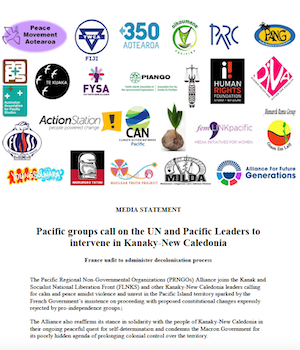
Pacific civil society and solidarity groups today stepped up their pressure on the French government, accusing it of a “heavy-handed” crackdown on indigenous Kanak protest in New Caledonia, comparing it to Indonesian security forces crushing West Papuan dissent.
A state of emergency was declared last week, at least six people have been killed — four of them indigenous Kanaks — and more than 200 people have been arrested after rioting in the capital Nouméa followed independence protests over controversial electoral changes
In Sydney, the Australia West Papua Association declared it was standing in solidarity with the Kanak people in their self-determination struggle against colonialism.
- READ MORE: New Caledonia unrest: Uneasy calm sets in as ‘massive’ reinforcements arrive
- Kanaky in flames: Five takeaways from the New Caledonia independence riots – David Robie
- Other Kanaky New Caledonia crisis reports
“New Caledonia is a colony of France. It’s on the UN list of non-self-governing territories,” said Joe Collins of AWPA in a statement.
“Like all colonial powers anywhere in the world, the first response to what started as peaceful protests is to send in more troops, declare a state of emergency and of course accuse a foreign power of fermenting unrest,” Collins said.
He was referring to the south Caucasus republic of Azerbaijan, which Paris has accused of distributing “anti-France propaganda” on social media about the riots, a claim denied by the Azeri government.
“In fact, the unrest is being caused by France itself,” Collins added.
France ‘should listen’
He said France should listen to the Kanak people.
In Port Vila, the international office of the United Liberation Movement of West Papua (ULMWP) issued a statement saying that West Papuans supported the Kanak and Socialist National Liberation Front (FLNKS) in “opposing the French colonial project”.
“Your tireless pursuit of self-determination for Kanaky people sets a profound example for West Papua,” said the statement signed by executive secretary Markus Haluk.

In Suva, the Pacific Regional Non-Governmental Organisations (PRNGOs) called for “calm and peace” blaming the unrest on the French government’s insistence on proceeding with proposed constitutional changes “expressly rejected by pro-independence groups”.
The alliance also reaffirmed its solidarity with the people of Kanaky New Caledonia in their ongoing peaceful quest for self-determination and condemned President Emmanuel Macron’ government for its “poorly hidden agenda of prolonging colonial control” over the Pacific territory.
“Growing frustration, especially among Kanak youth, at what is seen locally as yet another French betrayal of the Kanaky people and other local communities seeking peaceful transition, has since erupted in riots and violence in Noumea and other regions,” the PRNGOs statement said.
The alliance called on the United Nations and Pacific Islands Forum (PIF) leaders to send a neutral mission to oversee and mediate dialogue over the Nouméa Accords of 1998 and political process.
In Aotearoa New Zealand, Kia Mua declared it was “watching with grave concern” the Macron government’s attempts to “derail the process for decolonisation and usurp the Nouméa Accords”.
It also called for the “de-escalation of the militarised French response to Kanak dissent and an end to the state of emergency”.
‘Devastating nuclearism, militarism’
For more than 300 years, “Te Moananui a Kiwa [Pacific Ocean] has been subjected to European colonialism, the criminality of which is obscured and hidden by Western presumptions of righteousness and legitimacy.”
The devastating effects of “nuclearism, militarism, extraction and economic globalisation on Indigenous culture and fragile ecosystems in the Pacific are an extension of that colonialism and must be halted”.
The Oceanian Independence Movement (OIM) demanded an immediate investigation “to provide full transparency into the deaths linked to the uprising in recent days”.
It called on indigenous people to be “extra vigilant” in the face of the state of emergency and and to record examples of “behaviour that harm your physical and moral integrity”.
The MOI said it supported the pro-independence CCAT (activist field groups) and blamed the upheaval on the “racist, colonialist, provocative and humiliating remarks” towards Kanaks by rightwing French politicians such as Southern provincial president Sonia Backés and Générations NC deputy in the National Assembly Nicolas Metzdorf.
Constitutional rules
The French National Assembly last week passed a bill changing the constutional rules for local provincial elections in New Caledonia, allowing French residents who have lived there for 10 years to vote.
This change to the electoral reform is against the terms of the 1998 Noumea Accord. That pact had agreed that only the indigenous Kanak people and long-term residents prior to 1998 would be eligible to vote in provincial ballots and local referendums.
The bill has yet to be ratified by Congress, a combined sitting of the Senate and National Assembly. The change would add an additional 25,000 non-indigenous voters to take part in local elections, dramatically changing the electoral demographics in New Caledonia to the disadvantage of indigenous Kanaks who make up 42 percent of the 270,000 population.
Yesterday, in the far north of Kanaky New Caledonia’s main island of Grande Terre, a group gathered to honour 10 Kanaks who were executed by guillotine on 18 May 1868. They had resisted the harsh colonial regime of Governor Guillan.












































